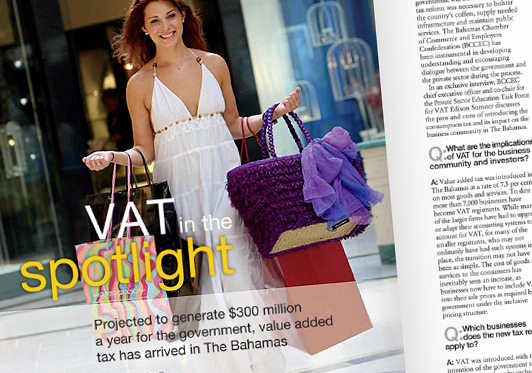| Published: Date: Updated: Author: |
The Bahamas Investor Magazine July 23, 2015 July 23, 2015 Steve Cotterill |
January 1, 2015, saw the introduction of value added tax in The Bahamas. This being a low tax jurisdiction, the move was controversial, but the government was clear that it felt that tax reform was necessary to bolster the country’s coffers, supply needed infrastructure and maintain public services. The Bahamas Chamber of Commerce and Employers Confederation (BCCEC) has been instrumental in developing understanding and encouraging dialogue between the government and the private sector during the process.
Click here to read or browse this feature using Turn-Page/Ezine mode.
In an exclusive interview, BCCEC chief executive officer and co-chair for the Private Sector Education Task Force for VAT Edison Sumner discusses the pros and cons of introducing the consumption tax and its impact on the business community in The Bahamas.
Q: What are the implications of VAT for the business community and investors?
A: Value added tax was introduced in The Bahamas at a rate of 7.5 per cent on most goods and services. To date more than 7,000 businesses have become VAT registrants. While many of the larger firms have had to upgrade or adapt their accounting systems to account for VAT, for many of the smaller registrants, who may not ordinarily have had such systems in place, the transition may not have been as simple. The cost of goods and services to the consumers has inevitably seen an increase, as businesses now have to include VAT into their sale prices as required by government under the inclusive pricing structure.
Q: Which businesses does the new tax regime apply to?
A: VAT was introduced with the intention of the government to broaden the tax base by including services and reduce the reliance on customs duties. Only VAT registrants can charge VAT. In general, financial, life and annuity insurance services supplied to persons or businesses in The Bahamas are exempt from VAT, while financial and insurance services supplied to persons or businesses outside The Bahamas are normally zero rated. Non-life insurance services such as property, health and casualty insurance were also exempt until June 30, 2015. VAT is now being charged on those services at the standard rate of 7.5 per cent. Under the VAT rules, only commercial bank fees, such as those for ATM cash withdrawals and other charges are subject to VAT, meaning that consumers will be charged the tax, and banks can recover associated “input” tax payments. Products and professional services supplied in the international financial services sector are zero rated. VAT is not charged on products and services provided to non-resident clientele. Also, as of January 1, 2015, the 7.5 per cent VAT has replaced the 10 per cent hotel occupancy tax.
Q: How is it being enforced?
A: The government has promised heightened enforcement measures for the implementation of value added tax. VAT was brought about to help correct the fiscal situation and the issue of tax non-compliance. BCCEC has long stressed that it is paramount for the government to ensure compliance and enforcement so that the system is not compromised. The administration of the new tax system has been undertaken by the Ministry of Finance’s VAT Unit and the Ministry of Finance’s financial secretary John Rolle currently serves as VAT comptroller. The government has also appointed a VAT Appeals Tribunal for businesses that may have a complaint against the VAT Unit. The VAT Department headed by the VAT comptroller is responsible for administering the tax. Eventually there will be a merger between the VAT Department and the Department of Inland Revenue to form the Central Revenue Administration (CRA), which will have ultimate responsibility for VAT and some of the other tax revenue streams.
Q: What are the obligations and penalties for businesses?
A: Companies had to be current with their business licence fees, real property taxes and National Insurance Board (NIB) contributions before they could complete the VAT registration process and obtain a Taxpayer Identification Number (TIN). November 30, 2014 was the deadline for registration of businesses above the $100,000 threshold and while the VAT Department was lenient during the transition period, fines and warnings were issued to a number of businesses that submitted late applications.
Companies that have registered for VAT are required to prominently display their VAT registration certificate at their place of business. Companies with a gross annual turnover that exceeds $5 million will be required to submit monthly VAT returns. Those with an annual turnover between $400,000 and $5 million will have to file quarterly VAT returns and VAT registrants earning less than $400,000 in annual sales have to file once every six months.
Based on the VAT Regulations 2014, there is a fine of up to $50,000 or a prison term of up to two years for “willfully” evading VAT; improper collection and advertisement of VAT; impeding the comptroller or a VAT officer in the administration of the VAT Act or for failure to comply with a requirement of confidentiality. According to the regulations, the offender can be fined $1,000 for each false statement on VAT. Additionally, VAT registrants who violate VAT-inclusive pricing could face as much as $100,000 in fines, up to a year in prison, or both.
Q: How are local businesses responding?
A: Ahead of VAT implementation, the Bahamas Chamber of Commerce and Employers Confederation’s Coalition for Responsible Taxation, which was co-chaired by Gowon Bowe and Robert Myers, has been integral in voicing private sector concerns and encouraging dialogue, as well as collaboration between the government and the private sector on tax reform and the need for fiscal responsibility. The coalition had initially proposed a payroll tax as an alternative to VAT and had commissioned Oxford Economics to conduct dynamic economic modelling of all potential tax reform options.
The implementation of VAT has been relatively smooth, due in large part to the private sector’s cooperation. There has been no major resistance from the private sector. However, despite ongoing concerns and reservations all businesses expected to register have done so. The private sector has generally exercised a great deal of maturity and cooperation. One of the positive effects of VAT is that it has forced many businesses that had not been tax compliant in terms of business license fees, real property tax and National Insurance Board contributions to become current or make arrangements to do so in order to comply with VAT registration requirements.
Q: Have there been any teething problems and if so, what were they?
A: The government’s 2014-15 Budget projections forecast that VAT will generate $150 million in revenues for the six months to end-June, and $300 million for the 2015-16 full-year. BCCEC, via the Coalition for Responsible Taxation, views fiscal responsibility legislation as something the government needs to implement given that VAT is now in place. Such legislation would make the government more accountable and transparent on spending. The coalition has also called for the enactment of freedom of information legislation.
Q: How successful is the tax reform proving?
A: The introduction of VAT is a key part of the government’s overall efforts to reform The Bahamas’ taxation system. Based on the initial returns and VAT roll-out thus far, the government has expressed optimism that it will meet its revenue generation target. However, the watchful eye of BCCEC and the private sector at large will be on the government to ensure that it is held to account for fiscal responsibility in managing the revenue generated from the new VAT regime.










